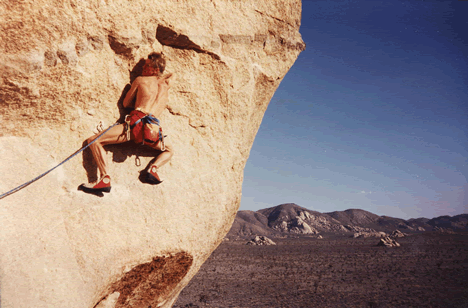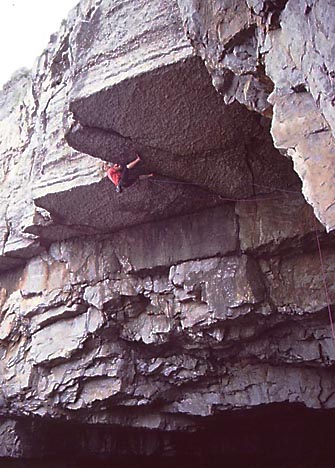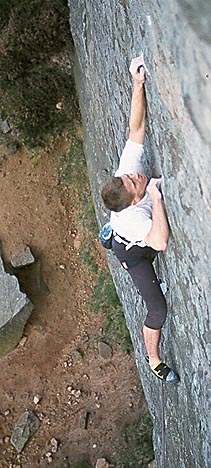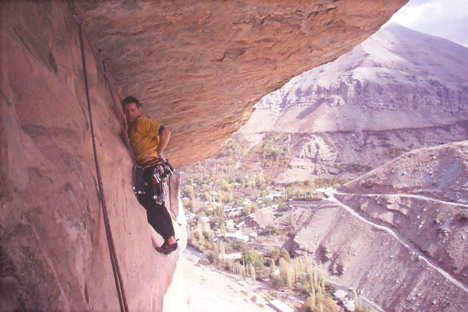|
John Arran's memorable climbs
|
 |
The Formative Years
It was all Howie Trillo's fault; were it not for him
I may never have climbed at all. He was a teacher at
my school when I was thirteen and enlisted a few of
his keener pupils for a trip to Staffordshire one weekend.
After that there was never any hope of escape, and the
obsession was free to grow unchecked.
Another teacher - Ted Lister - took over the mentor's
role a couple of years later when Howie was struggling
to keep up. Ted had been a great climber in the seventies,
repeating many of the country's hardest routes as soon
as the magazines reported them, and as a result I quickly
began to reassess what I thought may be possible for
me. In fact I climbed my first Extreme (which has now
been upgraded to E3) partly because I knew he had backed
off it only a couple of weeks before!
Eventually, in the eighties, I found myself climbing
routes which were generally considered hard, though
it took some time before I realised that many of the
famous (to me anyway) climbers I read about in the magazines
weren't actually climbing any better than I was. By
this time I had read a lot about the world class climbing
in Yosemite and Colorado, and decided that this was
the place for me.
| 1976 |
chicken run |
mod |
seconded |
roaches |
first outdoor climb, thanks to howard trillo |
 |
| 1980 |
synopsis |
E3 5c |
onsight |
froggatt |
first extreme |
|
| 1984 |
gnome man's land |
E5 6b |
onsight(ish) first ascent |
stanage |
climbed after abseil inspection |
|
The American Adventure
 |
 |
"Sole
Fusion" 5.12b Joshua Tree 1987
|
A three month tour ended up lasting nearly three years,
so good was the climbing and so pleasurable was the
climate and lifestyle in Boulder, Colorado.
In Yosemite I climbed an early repeat of Phoenix (5.13)
and cruised El Cap's West Face, but it was climbing
in Colorado's Eldorado Canyon which gave me the most
pleasure.
I quickly became proficient in soloing, and would climb
for hours on Redgarden Wall up and down routes of 5.9
and 5.10, often onsight, before returning to the ground.
Sometimes I would tandem solo with Derek Hersey and
all the while we would be laughing so much it would
be easy to forget I was onsighting 5.10+ (E3). But most
of the time I would solo alone, ticking off the classics
such as Outer Space (5.10 - barefoot!), T2 (5.10) and
The Naked Edge (5.11). Perhaps the most memorable experience
was onsight soloing the classic scarer Jules Verne (5.11)
on a blisteringly hot summer afternoon.
| 1985 |
naked edge |
5.11 |
solo |
eldorado canyon |
|
|
| 1985 |
jules verne |
5.11 |
onsight solo |
eldorado canyon |
|
 |
| 1986 |
phoenix |
5.13a |
ground-up |
yosemite |
|
|
| 1987 |
rough roof |
5.12c R |
first ascent |
eldorado canyon |
no falls after abseil inspection to place knifeblade peg |
|
A Sporting Life
In 1990 climbing competitions were very new and very
strange. Waiting in isolation for my turn to compete,
I couldn't help but be intimidated by the sight of all
the people I recognised from magazines, and it was a
real surprise to me when I beat almost all of them,
finishing fourth (third Brit). And an even bigger surprise
when I learned that this was good enough for me to be
selected to go to Vienna to compete as part of the British
team.
Although I was never going to be a world-beater, I
enjoyed competing internationally for six years and
managed occasionally to make World Cup semi-finals.
A competition also provided one of my finest climbing
moments to date, when I managed to beat the then unstoppable
Ian Vickers on my way to winning a national BICC event.
In the early 1990s sportclimbing was new and in vogue.
Training principles were poorly understood and the climbs
themselves were often poorly equipped, but the scene
was vibrant, sociable and enormously supportive. All
of which helped in pushing me to achieve ever higher
onsight and redpoint grades. The physicality of sportclimbing,
and the routereading skills required for hard onsights,
would also stand me in very good stead when I finally
began to look for challenges outside of sportclimbing
and competitions...
| 1990 |
bendcrete open international leading comp |
4th |
|
olympia, london |
first ever comp |
|
| 1992 |
bicc national leading comp |
1st |
|
undercover rock, bristol |
|
|
| 1993 |
cauchmar de l'éléphant |
8a |
onsight |
buoux |
first 8a onsight |
|
| 1993 |
british team trials |
1st |
|
rock face, birmingham |
|
|
| 1993 |
predator |
8b |
|
malham |
first 8b |
|
| 2004 |
? |
8a |
onsight |
gorge du tarn |
still onsighting 8a eleven years later |
|
The Trad Revival
 |
 |
| |
"Horizontal
Pleasures" E7 6c Pembroke 1996
|
It was Pembroke which fired my enthusiasm for new routing.
I'd been doing more trad climbing for a little while,
but when I saw a crack in the huge roof at Trevallen
- so obviously climbable but so obviously hard - I couldn't
resist having a go. The result ('Horizontal Pleasures')
is one of my favourite climbs of all time and surprisingly
remains unrepeated to this day.
Thus began a new-routing blitz of Pembroke, which
has so far resulted in over twenty new climbs of E6
and E7, almost all climbed onsight or ground-up.
Though interspersed with hard onsights elsewhere -
I particularly
enjoyed the adventure terrain of Gogarth or the Lleyn
peninsular - it was Pembroke's protectable but committing
limestone which yielded many of the best
adventures. And the fitness gained from years of
sportclimbing
proved invaluable in coping with the often alarming
and unrelenting steepness. The relative inaccessibility
of the Range West military range meant that many big
and obvious lines were still untouched, just waiting
for a military briefing, a dry weekend and a hefty
dose of onsight commitment.
During this time Dave Turnbull talked me into going
up to Orkney with him for a rather bigger challenge.
Drummond's 7-day epic aid route had defiantly remained
unrepeated for 27 years, despite the attentions of
such
notable climbers as Johnny Dawes and John Dunne. Dave's
lead of the 50m green off-width was more than welcome,
though it was up to me to overcome many of the route's
other diverse difficulties, including working and eventually
redpointing the short but very hard technical
crux. Four
days
it
took us in all, spread over two trips, but with two
new routes on the Old Man of Hoy and a staggeringly
good E6/7 onsight new route on Rora Head into the bargain,
these two short trips were some of the most successful
ever.
| 1994 |
the cad (without bolt) |
E6 |
onsight |
gogarth |
|
|
| 1995 |
horizontal pleasures |
E7 6c |
first ascent |
trevallen, pembroke |
the start of the pembroke blitz |
|
| 1996 |
enchanted broccoli garden |
E7 6b |
onsight |
gogarth |
first E7 onsight |
|
| 1996 |
perfectly ridiculous |
E7 6b |
onsight first ascent |
range west, pembroke |
|
|
| 1997 |
orkneyinga saga |
E6 6a |
first free ascent |
old man of hoy |
the first of two great new routes on the old
man that year
|
 |
| 1997 |
long hope route |
E7 6c |
first free ascent |
st. john's head, hoy |
27 years after drummond's amazing 7-day first
ascent (4 days)
|
 |
| 1997 |
many a mickle makes a muckle |
E6/7 6b |
onsight first ascent |
mucklehouse wall, rora head, hoy |
maybe the hardest onsight new route in Scotland at the time |
|
| 1998 |
the beautiful south |
E7 6b |
first ascent |
sron ulladale |
|
|
| 1998 |
lone ranger |
E5 6a |
onsight solo first ascent |
range west, pembroke |
|
|
| 2002 |
ironman |
E7 6b |
first ascent |
range west, pembroke |
|
|
Mind Games on Grit
 |
 |
| |
"Doctor
Dolittle" E10 7a Curbar 2001
|
By the mid 1990s gritstone was in fashion again. Not
for twenty years had there been such widespread and
fervent interest in the climbing of the ten-metre, nearly
holdless and often protectionless blank walls and arêtes
of the Peak District's millstone grit. New routes of
ground-breaking severity, at bone-breaking heights,
were being climbed almost weekly during the winter months.
I too became infected by the new Grit craze, finding
and climbing new E7s in short order. But it was not
until the release of the video masterpiece 'Hard Grit',
with its heart-stoping tension and captivating action
sequences, that I felt I wanted to know what climbing
really hard grit would feel like. A new blank
line, seven days of effort, and five minutes of ultimate
concentration and climbing control, and I had succeeded
in climbing 'The Zone', at E9 as challenging as any
climb in Britain at the time.
There are always blanker walls and harder lines, and
I was still in the throes of gritstone headpointing
fever, so I found one such large and apparently holdless
wall and set to work. Little did I know that almost
three years would pass before I finally would succeed
on 'Doctor Dolittle', E10 7a and a contender for the
hardest route in Britain.
But gritstone is about more than the pursuit of pure
difficulty; the short and accessible nature of the routes
is perfect for multi-route challenges, and so it was
that I set off - in the footsteps of Ron Fawcett, one
of the greatest climbers of all time - to climb one
hundred Extremes (climbs of E1 or above) in one day
and, as an added twist, on one crag. By the end of a
very long and exceptionally tiring day I had completed
my challenge and developed a huge respect for Ron's
solo achievement many years before.
And as if that wasn't arduous enough an even more madcap
challenge awaited. Together with Shane Ohly we each
succeeded in our objective of climbing over 500 routes
in one eighteen-hour day, setting records for both the
number of routes and the total length of climbing achieved
within 24 hours.
| 1998 |
monotheism |
E7 6b |
first ascent |
gardoms |
first hard grit route |
|
| 1998 |
crack and slab |
E7 7a |
first ascent |
curbar |
|
|
| 1998 |
the zone |
E9 6c |
first ascent |
curbar |
first E9 |
 |
| 2001 |
100 extremes in a day |
|
55 of them onsight |
stanage |
a single-crag version of ron's historic grand
day out |
 |
| 2001 |
doctor dolittle |
E10 |
first ascent |
curbar |
guidebook grade - unwilling to guess an onsight
grade i proposed H9 |
|
| 2003 |
536 routes in a day |
|
|
peak district |
4897m of climbing |
|
The Intrepid Explorer
 |
 |
"Pega"
E6 6b First Free Ascent Iran 2001
|
Climbing 1200ft seacliffs over four days in Scotland
had whet my appetite for big walls and big challenges,
and they don't come much bigger than the thousand-metre
granite towers of Kyrgyzstan.
After three days of hard on-sight free climbing and
rope fixing, Anne and I set off at 3am to finish what
looked set to be the most challenging trad rock route
in the valley and one of the hardest in the whole of
Asia. Despite an enforced bivouac in a storm just a
few metres from the summit, we returned fired with enthusiasm
for more exotic adventures.
A brief sojourn in Iran kept the flame alive, but work
commitments prevented another major expedition until
early in 2002 when we discovered the joys of Venezuelan
tepuis.
Climbing immediately behind the top aid-climbing team
of José Pereyra and Timmy O'Neill, we managed
to either onsight or headpoint all 25 pitches of the
700m jungle tower called Cerro Autana. With climbing
up to E7 6c, and taking us twelve days on the wall,
it was certainly the hardest climb Anne and I had done
as a team, and despite its inaccessible jungle location
it appears also to be one of the hardest trad-protected
big-wall free climbs in existence.
With so many towers and so much good rock to go at,
we returned a year later and climbed another new tepui
tower, this time just as a three and with no aid-climbing
assistance. Despite the slightly easier (E6) climbing,
the fact that we managed all of the 21 pitches onsight
with no falls, and that we placed not a single bolt
or peg on the entire route, made this climb every bit
as satisfying.
But nothing could compare with Angel Falls - the granddaddy of tepui big walls. We tried it in 2002 and again in 2003, but not until 2005 did we manage to assemble the best team with the best equipment and an unshakeable conviction that this time it would go free. The main 1000m wall had been climbed only once before, and it is testimony to its difficulty and inacessibility that this A4 aid route is still unrepeated after 15 years. Our free line covered much of the same first half as the aid line but then headed off into virgin territory to finish within a stone's throw of the falls' glistening spout. In all nine E7 pitches were climbed, five onsight. Two of these fell to me, one being pitch 29 of the route's 31 pitches and climbed on the seventeenth consecutive day of climbing effort. Such an adventure is going to be hard to follow!
| 1999 |
the philosopher's stone |
E6 6b |
onsight first ascent |
ak su valley, kyrgyzstan |
25 pitches all onsight (4 days) |
 |
| 2001 |
pega |
E6 6b |
onsight first free ascent |
iran |
iran's hardest trad route |
|
| 2002 |
cerro autana sw face |
E7 6c |
first ascent |
venezuela |
venezuela's hardest free route: 25 pitches mostly
E4 and above (12 days) |
 |
| 2003 |
holey moses |
E7 6b |
first ascent |
sinai, egypt |
egypt's hardest route |
 |
| 2003 |
acopántepui |
E6 6b |
onsight first ascent |
venezuela |
21 pitches all onsight with no fixed gear (6 days) |
 |
| 2004 |
'heart of cow' and 'mimi shan' peaks |
E4 5c |
onsight first ascents |
western sichuan, china |
first ascents of one major and one subsiduary peak, both around 5000m, by technical rock routes |
|
| 2005 |
rainbow jambaia |
E7 6b |
first ascent |
angel falls, venezuela |
first free ascent of the main angel falls amphitheatre wall by a substantially new line. its 30 pitches included nine E7s and took the seven-person team nineteen days to climb |
|
|
